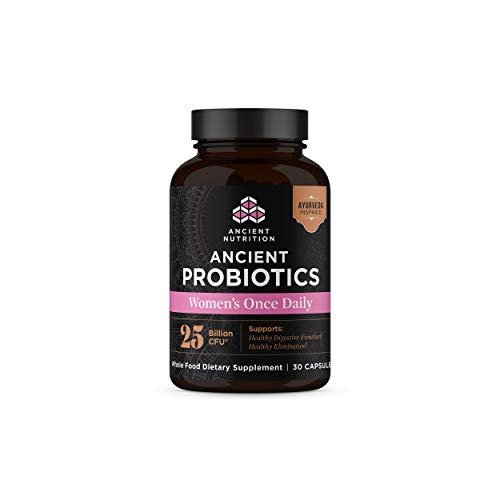
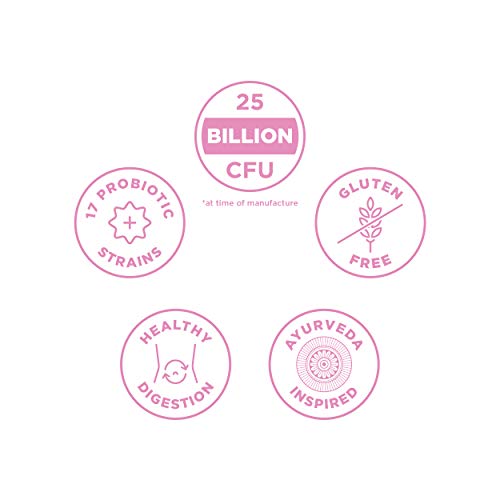
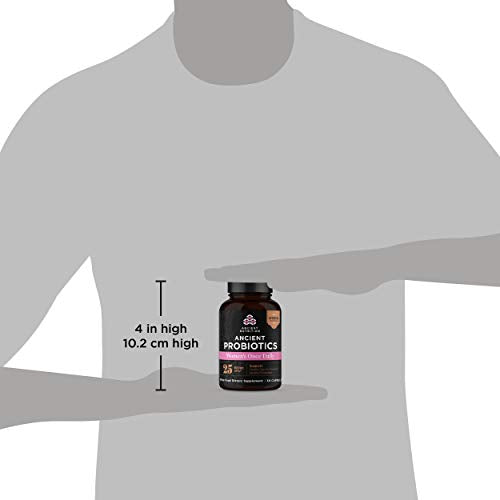
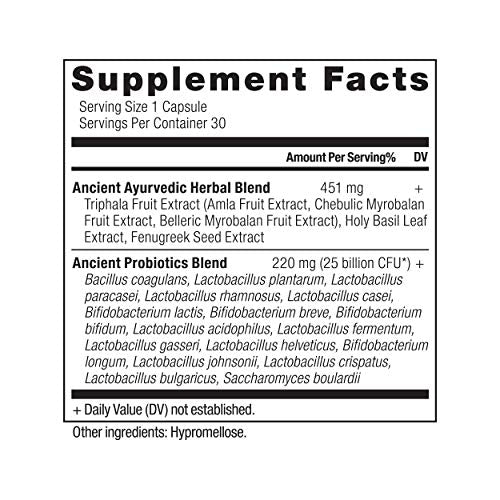
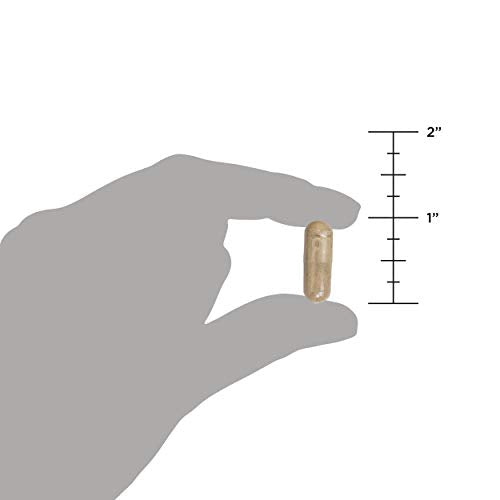
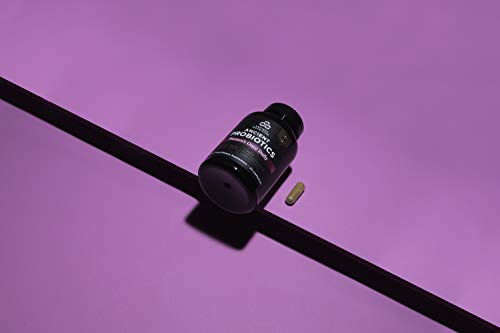
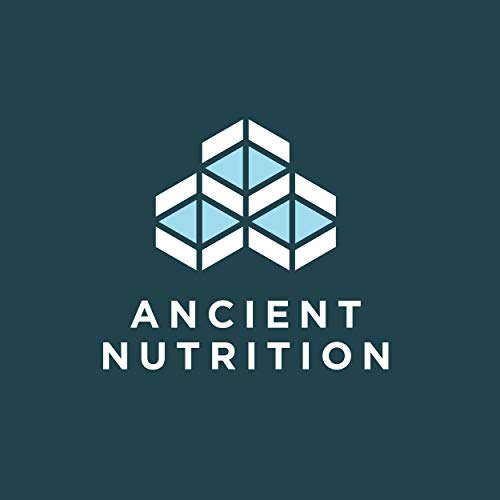
Ancient Nutrition Probiotic for Women - 25 Billion CFUs, Gluten Free, 30 Capsules


Lactobacillus Casei
Low RiskLactobacillus casei is a type of probiotic bacteria commonly found in fermented foods and dietary supplements. It is primarily used to promote gut health and support the immune system by maintaining a balanced microbiota in the gastrointestinal tract.
Sustai Insights
Lactobacillus casei offers functional benefits as a probiotic, enhancing digestive health and potentially improving immune responses. It is generally regarded as safe, with low concerns regarding carcinogenicity, allergies, or reproductive toxicity. Environmental risks are minimal, and it is not subject to specific regulatory restrictions. Overall, it is assessed as low risk, and safe usage is suggested, although alternatives like Lactobacillus acidophilus may be considered for similar benefits.
Bifidobacterium Longum
Low RiskBifidobacterium longum is a type of beneficial bacteria commonly found in the human gut. It plays a key role in maintaining gut health, supporting digestion, and enhancing the immune response. Its primary function in products is often as a probiotic ingredient, promoting a balanced microbiome.
Sustai Insights
Bifidobacterium longum offers functional benefits as a probiotic, contributing to digestive health and immune support. It is considered low risk for health concerns such as carcinogenicity, allergies, or reproductive toxicity. Environmentally, it poses minimal risks, with no significant pollutant or bioaccumulation potential. Regulatory bodies do not impose restrictions on its use, indicating a favorable status. Overall, this ingredient can be safely used in products, making it a low-risk option for consumers.
Lactobacillus Acidophilus
Low RiskLactobacillus acidophilus is a probiotic bacterium commonly found in the human gut and fermented foods. It plays a key role in digestion and gut health, often used in dietary supplements and functional foods to promote beneficial gut flora.
Sustai Insights
Lactobacillus acidophilus offers functional benefits by supporting digestive health and balancing intestinal microbiota. It is generally recognized as safe with low health risks, including negligible concerns for cancer, allergies, and reproductive toxicity. Environmentally, it poses minimal risk. Regulatory bodies do not impose restrictions on its use. Overall, it holds a low risk profile, making it a favorable ingredient in health products.
Lactobacillus Rhamnosus
Low RiskLactobacillus rhamnosus is a type of beneficial bacteria commonly found in fermented foods and probiotics. It is predominantly used for its probiotic properties, supporting gut health and contributing to the balance of intestinal microflora in various health products.
Sustai Insights
Lactobacillus rhamnosus offers functional benefits as a probiotic, promoting digestive health and potentially enhancing immune function. It is considered safe with low concerns for carcinogenicity, allergies, and reproductive toxicity. Regulatory bodies have not imposed restrictions on its use. While not known for environmental hazards, further research on its ecological impact is warranted. Overall, it poses a low risk, and safe usage practices include adhering to recommended dosages. Alternatives include other probiotic strains like Lactobacillus acidophilus.
Lactobacillus Plantarum
Low RiskLactobacillus plantarum is a type of beneficial bacteria commonly found in fermented foods. It functions primarily as a probiotic, promoting gut health by maintaining a balanced microbiome and supporting digestion. This ingredient is often included in dietary supplements and functional foods for its health benefits.
Sustai Insights
Lactobacillus plantarum provides functional benefits as a probiotic, contributing to digestive health and gut flora balance. It is not associated with significant health risks, as concerns related to carcinogenicity, allergies, and reproductive toxicity are low. Environmentally, it poses minimal risks. Regulatory bodies have not issued any warnings or restrictions for its use, indicating a low overall risk. Safe usage practices include following recommended dosages, and alternatives like other probiotic strains may be considered. Overall, this ingredient is assessed as low risk.
Hydroxymethylcellulose
Low RiskHydroxymethylcellulose is a synthetic polymer derived from cellulose, primarily used as a thickening agent, emulsifier, and film-forming agent in various personal care and cosmetic products. It enhances texture, stability, and moisture retention, making it suitable for use in creams, lotions, and gels.
Sustai Insights
Hydroxymethylcellulose serves effectively as a thickener and stabilizer, contributing to product texture and moisture retention. It is considered low risk for health concerns such as carcinogenicity, allergies, and reproductive toxicity. Environmentally, it is not classified as a pollutant or bioaccumulative, aligning with regulatory standards in multiple regions. Overall, its risk level is assessed as low, with no significant adverse effects reported. Safe usage practices should be followed, and while alternatives exist, hydroxymethylcellulose remains a suitable choice in formulations.
Lactobacillus Casei
Low RiskLactobacillus casei is a type of probiotic bacteria commonly found in fermented foods and dietary supplements. It is primarily used to promote gut health and support the immune system by maintaining a balanced microbiota in the gastrointestinal tract.
Sustai Insights
Lactobacillus casei offers functional benefits as a probiotic, enhancing digestive health and potentially improving immune responses. It is generally regarded as safe, with low concerns regarding carcinogenicity, allergies, or reproductive toxicity. Environmental risks are minimal, and it is not subject to specific regulatory restrictions. Overall, it is assessed as low risk, and safe usage is suggested, although alternatives like Lactobacillus acidophilus may be considered for similar benefits.
Bifidobacterium Longum
Low RiskBifidobacterium longum is a type of beneficial bacteria commonly found in the human gut. It plays a key role in maintaining gut health, supporting digestion, and enhancing the immune response. Its primary function in products is often as a probiotic ingredient, promoting a balanced microbiome.
Sustai Insights
Bifidobacterium longum offers functional benefits as a probiotic, contributing to digestive health and immune support. It is considered low risk for health concerns such as carcinogenicity, allergies, or reproductive toxicity. Environmentally, it poses minimal risks, with no significant pollutant or bioaccumulation potential. Regulatory bodies do not impose restrictions on its use, indicating a favorable status. Overall, this ingredient can be safely used in products, making it a low-risk option for consumers.
Lactobacillus Acidophilus
Low RiskLactobacillus acidophilus is a probiotic bacterium commonly found in the human gut and fermented foods. It plays a key role in digestion and gut health, often used in dietary supplements and functional foods to promote beneficial gut flora.
Sustai Insights
Lactobacillus acidophilus offers functional benefits by supporting digestive health and balancing intestinal microbiota. It is generally recognized as safe with low health risks, including negligible concerns for cancer, allergies, and reproductive toxicity. Environmentally, it poses minimal risk. Regulatory bodies do not impose restrictions on its use. Overall, it holds a low risk profile, making it a favorable ingredient in health products.
Lactobacillus Rhamnosus
Low RiskLactobacillus rhamnosus is a type of beneficial bacteria commonly found in fermented foods and probiotics. It is predominantly used for its probiotic properties, supporting gut health and contributing to the balance of intestinal microflora in various health products.
Sustai Insights
Lactobacillus rhamnosus offers functional benefits as a probiotic, promoting digestive health and potentially enhancing immune function. It is considered safe with low concerns for carcinogenicity, allergies, and reproductive toxicity. Regulatory bodies have not imposed restrictions on its use. While not known for environmental hazards, further research on its ecological impact is warranted. Overall, it poses a low risk, and safe usage practices include adhering to recommended dosages. Alternatives include other probiotic strains like Lactobacillus acidophilus.
Lactobacillus Plantarum
Low RiskLactobacillus plantarum is a type of beneficial bacteria commonly found in fermented foods. It functions primarily as a probiotic, promoting gut health by maintaining a balanced microbiome and supporting digestion. This ingredient is often included in dietary supplements and functional foods for its health benefits.
Sustai Insights
Lactobacillus plantarum provides functional benefits as a probiotic, contributing to digestive health and gut flora balance. It is not associated with significant health risks, as concerns related to carcinogenicity, allergies, and reproductive toxicity are low. Environmentally, it poses minimal risks. Regulatory bodies have not issued any warnings or restrictions for its use, indicating a low overall risk. Safe usage practices include following recommended dosages, and alternatives like other probiotic strains may be considered. Overall, this ingredient is assessed as low risk.
Hydroxymethylcellulose
Low RiskHydroxymethylcellulose is a synthetic polymer derived from cellulose, primarily used as a thickening agent, emulsifier, and film-forming agent in various personal care and cosmetic products. It enhances texture, stability, and moisture retention, making it suitable for use in creams, lotions, and gels.
Sustai Insights
Hydroxymethylcellulose serves effectively as a thickener and stabilizer, contributing to product texture and moisture retention. It is considered low risk for health concerns such as carcinogenicity, allergies, and reproductive toxicity. Environmentally, it is not classified as a pollutant or bioaccumulative, aligning with regulatory standards in multiple regions. Overall, its risk level is assessed as low, with no significant adverse effects reported. Safe usage practices should be followed, and while alternatives exist, hydroxymethylcellulose remains a suitable choice in formulations.
Discover the power of Ancient Nutrition Probiotics for Women, designed to support digestive and immune health. Each capsule delivers 25 billion CFUs from 17 specially selected probiotic strains, empowering women to maintain gut balance and alleviate bloating and constipation naturally.
- Digestive Support: Nourishes the gut with good bacteria, promoting a healthy digestive tract resistant to harsh environments.
- Gluten Free & Allergen-Free: Formulated without gluten, soy, or artificial ingredients, making it a safe choice for sensitive individuals.
- No Refrigeration Needed: Soil-based organisms thrive without refrigeration, ensuring potency and effectiveness as they traverse the digestive system.
- Easy Daily Use: Simply take one capsule daily with water on an empty stomach for optimal absorption and consistent gut health.
- Ancient Nutrition Promise: Backed by a satisfaction guarantee, reflecting a commitment to quality and customer care for a worry-free experience.
Subscribe & Save with Sustai
- Best Price Guarantee: Always enjoy the lowest prices on sustainable home essentials.
- No Surprises: We’ll notify you before shipping. No hidden fees, ever.
- You’re in Charge: Change, pause, or cancel your subscription anytime with ease.
- Eco-Friendly Deliveries: Our grouped shipments mean less packaging and lower emissions.
Join us on a sustainable journey. Special offers for a limited time! Prices and promotions may change.
Recommended Products
Discover the power of Ancient Nutrition Probiotics for Women, designed to support digestive and immune health. Each capsule delivers 25 billion CFUs from 17 specially selected probiotic strains, empowering women to maintain gut balance and alleviate bloating and constipation naturally.
- Digestive Support: Nourishes the gut with good bacteria, promoting a healthy digestive tract resistant to harsh environments.
- Gluten Free & Allergen-Free: Formulated without gluten, soy, or artificial ingredients, making it a safe choice for sensitive individuals.
- No Refrigeration Needed: Soil-based organisms thrive without refrigeration, ensuring potency and effectiveness as they traverse the digestive system.
- Easy Daily Use: Simply take one capsule daily with water on an empty stomach for optimal absorption and consistent gut health.
- Ancient Nutrition Promise: Backed by a satisfaction guarantee, reflecting a commitment to quality and customer care for a worry-free experience.

You can have at most 2 Sustainable Steals products in your cart
Customer Reviews
Customers’ View
Customers appreciate the effectiveness and quality of this probiotic supplement, noting its gentle nature and positive impact on digestive health. Many users report significant improvements in their digestion, with comments highlighting that it does not cause stomach issues and helps alleviate feelings of bloating and gas. The product's formulation specifically designed for women's digestive needs is also well-received, with users acknowledging its ease of swallowing and convenience for daily use. Additionally, the allergen-friendly ingredients resonate with health-conscious consumers. Overall, customers find this probiotic to be a reliable option that aligns with their wellness goals.
AI-generated from the text of customer reviewsThis product has no reviews yet.




